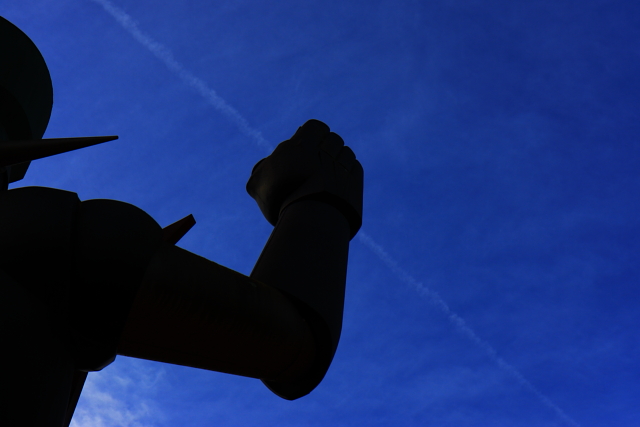
Richard B. Gunderman on Having Super Powers
We Make a Life by What We Give (Indiana University Press: August 1, 2009), pp. 191-3.When we think about our place in the universe, we seem infinitesimally small. The height of a human being is about one ten millionth of the diameter of the earth. The diameter of the earth, in turn, is one ten thousandth of the distance from the earth to the sun. This distance is only about one millionth of the distance between our sun and the nearest star. And the distance between the sun and the nearest star is about one twenty-five thousandth of the size of the known universe. The mass of a human being is measured in tens of kilograms, while the mass of the earth is measured in tens of kilograms to the twenty-fourth power (multiplying ten by ten twenty-four times), and the mass of the sun is tens of kilograms to the thirtieth power. ¶ In other words, any human being, in fact all human beings, are unimaginably small parts of an unimaginably large whole. That we are small, however, does not mean that we are necessarily unimportant. What we lack quantitatively in bulk we make up for qualitatively in special powers that these massive objects lack. These are our powers to know and love. …
Although the earth and the sun are bigger by an incredible margin than a human being, neither one, so far as we know, is aware of itself. We can do things they cannot. We can calculate the diameter and mad of the earth and sun. We can study the composition of the sun and the earth’s inhabitants. Some of these inhabitants we can not only know but love. these are activities of which the vast majority of objects in the universe seem to be utterly incapable.
We too are made up of matter, but we are a special kind of matter. We are matter aware of itself, concerned with itself, and engaged in relationships of a sort that mere physical forces such as electromagnetism and gravity do not begin to capture. In a universe made up mainly of matter in motion, we are something special. All living things have powers that inanimate matter lacks, such as growth, development, reproduction, and metabolism, the ability to sustain our existence by taking in matter and energy from the world around us. The sun is merely burning up its fuel, but a living organism uses food to recreate itself. Compared to plants, animals have still more powers, such as the ability to sense and respond to the environment, and to move about on their own power. To be an animal is to desire, to be turned outward toward the world around us.
Just as plants differ qualitatively from inanimate matter and animals differ qualitatively from plants, so human being seem to differ qualitatively from other animals. We differ in our special powers to know and to love. In comparison with the creatures of fantasy, we may seem limited. Unlike the Greek gods or contemporary comic book heroes, we are not immortal or invulnerable. We are incapable of unaided flight, lack X-ray vision and the ability to render ourselves invisible, and cannot lift objects that weigh significantly more than we do. However, we do possess these remarkable capacities to know and love. We are not the universe, the galaxy, the sun, the earth, the sky, the ocean, a tree, or a squirrel and yet we are capable of understanding each of them. From the starry universe above to the smallest subatomic particles of which all matter is made, as well as the forces governing interactions at each of these levels, our minds range over a great expanse of creation.
What if, compared to other creatures, we have been given super powers? What if we are the creatures endowed with the capacity not only to exist, but to know and love on another as well? What if each of us has such super powers but we tend not to notice them because everyone else has them too? What if our failure to notice them means that these powers often go largely untapped? What if most of us go through life without realizing our full potential? What if, compared to other creatures, we are like angels, capable of participating to some degree in the divine through these powers to know and love? What if our curiosity is a gateway to richer dimensions of reality? What if our capacity to love is an invitation to glimpse the mind of God?
Such a vision may appear fanciful, but what if it is true?